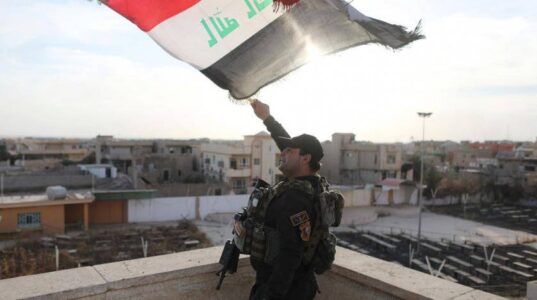
Iraqi security forces pursue Islamic State remnants in western Iraq
The Iraqi security forces launched a military operation to pursue ISIS cells in various areas to the west of the country in Kirkuk, Saladin, and Nineveh, including Kanous Island, one of ISIS’ strongholds.
The forces issued a statement announcing that Iraqi artillery violently bombed Kanous, in preparation for storming it and clearing it of the remnants of the terrorist organization.
In addition, the Diyala Intelligence Directorate of the Ministry of Interior arrested ISIS commander Abu Taha al-Bakri, who is in charge of kidnap and assassination operations.
The directorate said in a statement on Monday, that Bakri was arrested based on intelligence information and confessions of arrested terrorists. Bakri admitted his responsibility for several terrorist operations.
Meanwhile, the Deputy Commander-Strategy of the Combined Joint Task Force – Operation Inherent Resolve, Major General Kevin Copsey, said that the international coalition does not have military units on Iraqi territories.
Copsey said during his meeting with Iraq’s National Security Advisor Qassim al-Araji that the coalition’s tasks were limited to providing advice to the Iraqi military.
Araji’s media office issued a statement after the meeting indicating that the officials discussed joint cooperation in the field of combating terrorism, strengthening security, and intelligence coordination.
The Iraqi advisor asserted that the security forces’ capabilities have greatly developed and they have grown capable of carrying out their tasks in maintaining security, confronting terrorist cells, and promoting peace.
According to the statement, Copsey confirmed the international coalition’s continued support to Iraq to help eliminate ISIS terrorist cells.
Meanwhile, security experts and strategists said that ISIS was trying to regain power in Iraq, however, ensuring that the support enjoyed by Prime Minister Mustafa Kadhimi from the international coalition would be sufficient to help eliminate the terrorist organization.
Strategist Moataz Mohieddine told Asharq Al-Awsat that despite the support of the international coalition, Iraqi forces would not be enough to secure the vast areas between northern Baghdad, Diyala, Kirkuk, and Saladin.
Mohieddine explained that ISIS was trying to expand its operations, cautioning that disagreement over who should be in charge of the areas, remained an issue between various parties.
National Security Professor Hussein Allawi believes the international coalition’s support to Iraq comes from its commitment towards the country.
Allawi told Asharq Al-Awsat that the PM was achieving progress, despite the fact that the political forces have not provided the government with ample assistance to carry out its tasks.
Source: Aawsat





